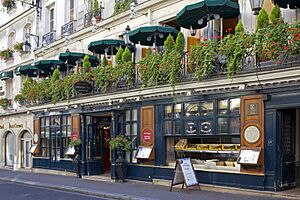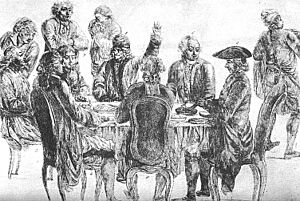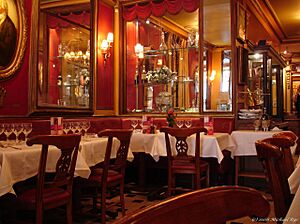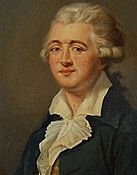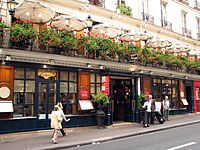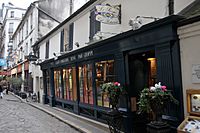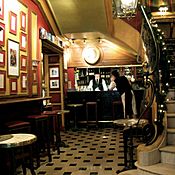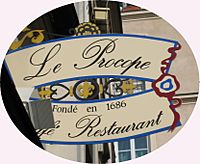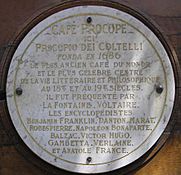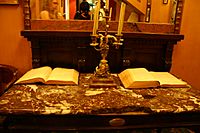Café Procope facts for kids
The Café Procope is a very old and famous café in Paris, France. It opened way back in 1686! It was started by a chef from Sicily named Procopio Cutò. For a long time, it was a popular meeting spot for artists, writers, and thinkers in Paris. Many important people like Marie Antoinette and Napoleon visited it. Some people say it's the oldest café in Paris that's always been open. However, the original café closed for a while in 1872 and only reopened as a café in the 1920s. So, that claim isn't completely true.
Contents
A Historic Parisian Café
This café is located on a street called Rue de l'Ancienne Comédie. Before opening his own place, Procopio Cutò learned from an Armenian immigrant named Pascal. Pascal had a small stand selling lemonade and coffee. When Pascal left Paris, Procopio took over.
The Café's Early Days
In 1686, Procopio moved his stand to a new spot. At first, people called it a "cave" because it was quite dark inside. But Procopio changed it completely! He bought an old bath house and turned it into a fancy café. He added beautiful crystal chandeliers, shiny wall mirrors, and elegant marble tables. These things are common in cafés today, but they were new and exciting back then.
Gentlemen would visit to drink coffee, which was a new and exotic drink. They also enjoyed sorbet, a frozen treat, served in pretty porcelain cups. Waiters wore special "Armenian" clothes.
A Hub for Famous Thinkers
A big theater, the Comédie-Française, opened right across the street from the café in 1689. This was great luck for the Café Procope! It started attracting many actors, writers, musicians, poets, and philosophers. Even revolutionaries and scientists came to visit.
In 1702, Procopio Cutò changed his name to the French version, François Procope. He also officially renamed his business to Café Procope, the name it still has today.
Throughout the 1700s, Café Procope became the main meeting place for smart people and those who loved to share news and gossip. Not everyone drank lots of coffee like Voltaire, who mixed his with chocolate. But many important figures met there, including Benjamin Franklin and Thomas Jefferson.
Above the door of the café, you can still see the words: Café à la Voltaire. This shows how important Voltaire was to the café. It's even said that the idea for the famous Encyclopédie was born at Café Procope. This huge book project was created by Denis Diderot and Jean le Rond d'Alembert.
During the French Revolution
During the French Revolution, the red Phrygian cap, which became a symbol of freedom, was first shown at the Procope. Many important revolutionaries, like Robespierre, Danton, and Marat, used the café as a meeting spot.
Even after the Revolution, the Café Procope kept its reputation as a place for writers and thinkers. Famous people like Alfred de Musset, George Sand, and Anatole France were regular visitors.
The "Oldest Café" Claim
A sign at the café says it is the oldest continuously running café in the world. It mentions many famous people who visited, like Voltaire, Benjamin Franklin, Napoleon, and Victor Hugo.
However, this claim isn't completely true. The original Café Procope closed in 1872. It was later reopened as a restaurant and then changed back into a café in the 1920s. A new owner realized how special the original name was and brought back "Café Procope."
In 1988–89, the café was renovated to look like it did in the 1700s. It got red walls, crystal chandeliers, and old-fashioned portraits of its famous visitors. The waiters even wore uniforms that looked like they were from the time of the French Revolution.
Images for kids
-
Plaque commemorating Benjamin Franklin's preparation of a Franco-American alliance in the café
See also
 In Spanish: Café Procope para niños
In Spanish: Café Procope para niños
 | Shirley Ann Jackson |
 | Garett Morgan |
 | J. Ernest Wilkins Jr. |
 | Elijah McCoy |


